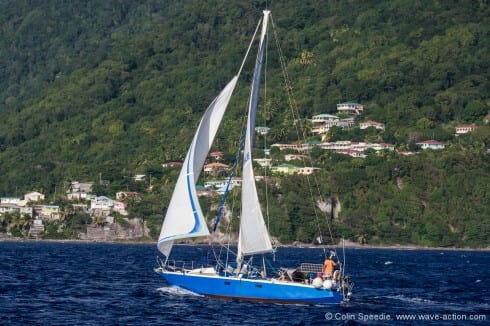
Cruising in the Caribbean has been a real eye-opener in many ways. Since we left the Canary Islands we’ve been sailing largely off the beaten track, and now we find ourselves back amongst a less nomadic tribe of sailors in a region that caters largely for the charter set.
This of course has good and bad sides. Services are far more available than they were in Senegal or Brazil, which is good, but the human dynamic that exists between the local people and the cruising crews is far more complicated. This is obvious when talking to regular cruisers of the area, when one subject always seems to rear its head above others—boat boys.
To listen to some people, you’d be led to believe that these guys are the lowest of the low, a mob of aggressive, abusive vermin who are out to damage your boat and rob you blind. Somehow the possibility that the vast majority of them are just poor people trying to survive in a harsh world becomes swept away in an unstoppable tide of vitriol, against which any plea to reason is doomed to be repulsed.
There’s no doubt that there are bad guys amongst them, but some sort of balance in the debate should surely be kept, that might in turn lead to a better understanding on both sides.
How do we appear to them?
We’ve often wondered what the local people make of us. To the solo fisherman incessantly bailing his dugout off Dakar, to the Brazilian sailor on a Saveiro up a river, or a simple fruit seller in St. Vincent, we must seem unbelievably rich. We arrive in our yachts, with no visible means of support, cameras at the ready, never doing a day’s work (as they would know it) and enjoying cold beer and good food in the local bars by night.
We once spent the best part of an hour trying to explain to a couple of elderly Brazilian fishermen a little about our lives, by the end of which it was clear that they were far more mystified than they had been at the beginning! To a guy who’s never known anything but hard physical work every day of his life just to survive, we must seem like big time lottery winners, every one of us. And so it should therefore come as no surprise to discover that many of them decide that a far easier way to make some sort of a living would be to trade with us.
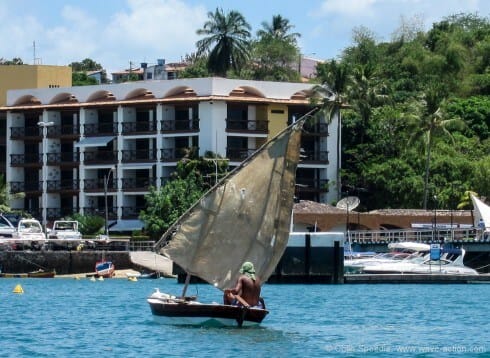
But the rules are different
Which is where things start to become complicated. Many of us have never been exposed to what passes as ‘trading’ in other cultures; at home we simply turn up, fill up, and pay up. But from your first encounter with a Moroccan rug merchant or a Bequian fruit seller you’re being introduced to the dark art of haggling, which takes time to learn and ultimately enjoy.
Louise is a natural, and it’s a pleasure to watch how she enters negotiations, at the end of which both parties have parted on good terms, honour intact. But equally we’ve watched crews engaged in haggling get out of their depth pretty quickly and end up in bitter recrimination, generally over a simple loss of face.
Two things stand out here—the first is to accept that haggling is largely a game, and there are no real winners or losers, just satisfied players. The second is that it doesn’t represent the most awful loss to pay a few pennies over the odds for some nice ripe mangoes—especially if the seller is in a leaky boat, has no shoes and there are six kids at home hoping for supper tonight—a sense of perspective is a necessary asset in the cruising life.
Different strokes
It’s also hard to get your head around the local politics. In Wallilabou Bay, St. Vincent, we were approached well out to sea by a couple of younger guys in a pirogue with a decent sized outboard, far more capable of intercepting a yacht at a distance than the little one-paddle sufferahs in their dugouts inside the Bay.
We followed the recommended protocol of refusing any help until we were right up in the anchorage before negotiating a deal to take our line ashore. This rapidly developed into a slanging match between the new style boat boys and the more traditional ones, which did nothing for our nerves and as far as we were concerned firmly rolled up the welcome mat.
Even after we were safely installed, loud recriminations rolled around the anchorage, as long-term grievances were amply and colourfully aired. Even though things never got worse than that, leaving next day was an easy decision to make.
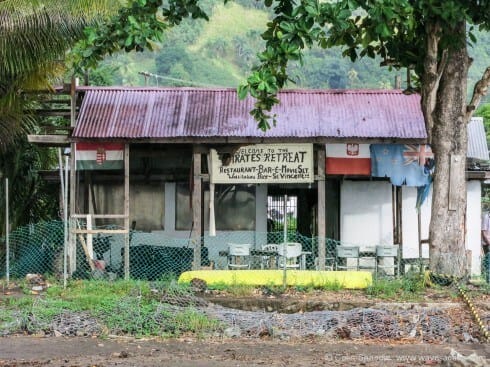
And of course it doesn’t stop on the water. Going ashore can leave you feeling besieged, too, as most places have at least a few hangers on (colourfully called ‘bumsters’ in west Africa) who will attach themselves to you the second you set foot on the beach.
Sometimes these characters can be useful, especially in remote places where they can be a lifeline if you’re trying to locate supplies, the only damage being a small gift to thank them for their help.
But I’m more wary of them than the waterborne guys, not least after one in St. Vincent asked me how many of us were aboard, which seemed to me like information that he really didn’t need to know at all. Always be a little wary of your new best friend, especially if you only met him five minutes ago.
What’s the scale of the problem?
In some places there is no problem—witness Bequia where a small, efficient armada of boats service the fleet very well, from fresh bread and fruit to laundry and wine.
In others, previously regarded as boat boy problem spots such as Roseau and Portsmouth in Dominica, sensible agreements between the locals have lead to an increasing number of yachts visiting and staying over longer periods. Now that the various operators are working more or less as a cooperative and are taking an interest in providing services and moorings, there’s more reason to go there. Competition has also been reduced and so a far more relaxed and polite dialogue exists between boat boys and yacht crews, to everyone’s benefit.
None of this should gloss over the fact that in some places there have been far more serious issues of theft and even attacks on yacht crews, or that at least some of those incidents have been attributed to boat boys, whether that has any foundation in reality or not. The tragic event that occurred this season in Vieux Fort, St. Lucia, with the boarding, assault and murder of a British skipper, can attest to that.
And while some places in the Caribbean do seem to be viewed more positively in terms of security, others are sliding down the reputational ladder (St. Lucia once again). But, as always, a sense of perspective needs to be kept, too, if you’re ever planning to sail anywhere except in the safest cruising grounds.
Crime exists everywhere, and we need look no further than our own inner cities to be reminded of that. And ultimately we do need to ensure that we know who the culprits are and whether there are underlying causes that need to be addressed before we fall into the trap of assigning guilt.
Social problems
We’ve been told on many occasions that the Caribbean has changed dramatically over the last thirty years, not least because of tourism, which has made a huge difference to many people’s standard of living.
On the other hand, many traditional ways of making a living have suffered dramatically. Free Trade decisions made on the other side of the world wrecked the banana growers’ livelihood in many islands, and overfishing to meet the demand of the tourist trade and feed a growing population has closed many fish markets—just two obvious examples.
Farmers who can no longer profitably grow bananas may well turn to other more profitable crops such as cannabis, and fishermen trying to eke a living out of heavily depleted seas might easily be persuaded to transport more lucrative produce instead—and where the drug trade goes, trouble follows, usually more for the local communities themselves than for visitors.

Add to that the simple fact that these islands remain poor places subject to terrifying natural forces—hurricanes, tropical storms and volcanic activity being but a few examples.
Whilst we were in Carriacou over Christmas, a major tropical depression passed through the islands, leaving a trail of destruction. The awe inspiring display of thunder and lightning, coupled with torrential rain caused major damage through most of the windward islands, with St. Vincent taking a huge hit that left many dead. A state of emergency was declared as a result, but clearly it will take years to put right the infrastructure that was destroyed, or the livelihoods disrupted.
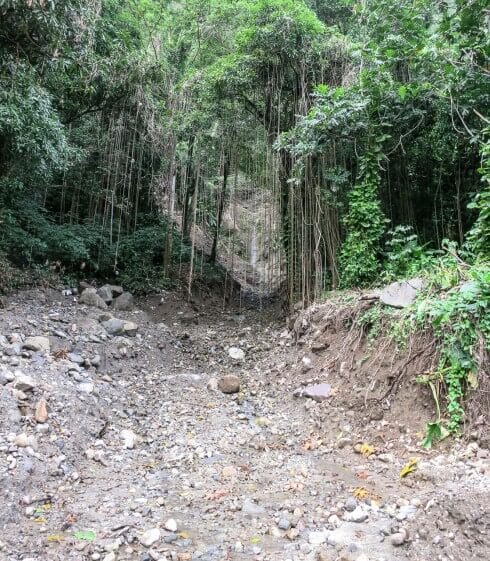
And finally there’s good old-fashioned desire, as the internet age reaches into every last corner of the globe spreading want where there was only previously need. In Africa it’s mobile phones—if the sight of a Maasai warrior way out in the bush chatting into his mobile doesn’t strike you as incongruous, nothing will.
In the Caribbean it’s the iPhone that is the latest must have accessory, whatever your social standing. What we have and take for granted, others want too, and there’s seemingly nothing we can do about it.
Do we need to learn anything ourselves?
There’s no doubt that the activities of some boat boys are at least a nuisance, but that’s about the limit of it in most cases. Yes, there are cases where local boats have been carelessly handled alongside yachts, leading to heated arguments. But equally, we’ve witnessed some acts of staggering rudeness and inconsiderate behaviour by yacht crews as well.
One charter crew anchored near us fouled a local boat’s mooring, dragged it around a little, and then when they finally got it to the surface went to cut it free, even though I had rowed over and offered to rig a slip line through it. Just how do you reach people who think that’s acceptable?
In Chateaubelair, St. Vincent, a place that formerly had a bad reputation, there’s a young guy called George who paddles faithfully out to meet every single yacht that comes in, day or night, and helps them to anchor. He hasn’t got his hand out all the time, although most people will be more than happy to give him something for his troubles. In our case he simply wanted some batteries for his head torch so he could help others enter in the dark! How can you say no to that? Yet it was clear from the attitude of some of the crews that came in, and who blatantly ignored him, that even that was too much to ask.
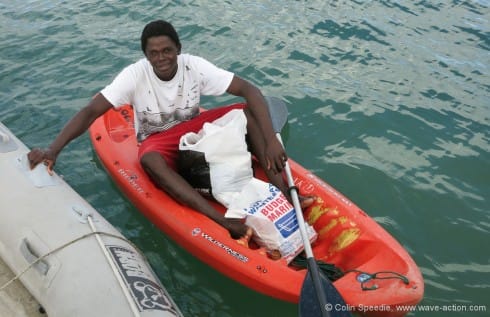
Constant attention from boat boys can be a nuisance, and we won’t pretend that there haven’t been times (usually at around 7 a.m.) that we haven’t fervently wished that they’d go away.
But on the other hand, we’ve had some really enjoyable dialogues, learned a lot about the places and the communities we’re in, and had some of the best mangoes in the world for next to nothing as a result of their presence.
And it’s worth remembering that, for the most part, these guys are engaged in trying to make a legitimate living in a poor place with very little in the way of the kind of social safety net that we in the west take for granted. Money is made round to go around, after all.
Our top tips for dealing with boat boys:
- Put some fenders out as soon as you’re in
- Decide in advance what (if any) services you require
- Don’t necessarily take the first offer
- Make it clear what would you would like in terms of services
- Negotiate a fair fee for any service in advance
- Be honest and polite in all your dealings
- If you pick up a mooring, check whom it belongs to, and pay for its use
- Check that the person you pay is the owner or person responsible for the mooring—not just some chancer
- It’s a good policy to dive on any mooring to check its condition—what you can see at the surface may not be representative of what’s down below
- If they take your line ashore to tie-up, do go and check it as soon as you can. It may be subject to chafe, tied up to a weedy looking sapling or secured with an icicle knot—which will melt in the sun…
And if you’d like to become part of the solution, consider joining one of the sailing and conservation charities that work with local communities such as Oceanswatch.
Editor’s Note
As a Bermudian I am well aware that the word “Boy” has a terrible usage history throughout the Islands and much of the North American continent. However, its use in “Boat Boy” has become, rightly or wrongly, general usage in the western Caribbean, which is the reason Colin used that designation for the men that practice that trade. We mean no disrespect.


Great article as usual
We have been to the Grenadines many time and each time have always had pleasant experiences with the Boat Boys. Showing respect is the most important thing you can do.
People frequently asked us upon our return from our 42,000 mile six year circumnavigation, “what was your favorite place?” We always answer “Planet Earth.” And it was always the people we met and the relationships we developed all the way around the world that made our trip so big. Colin is so correct when he points out that others perception of us as fabulously wealthy and even so the disparity is usually even greater than that. We cannot let that be a barrier and that barrier can be broken by taking the time to meet the local people. Indeed if we do not engage others why in the world are we even going out there? There are plenty of people just like us here at home.
I often find my mind back out there, sometimes sparked by photos of our trip, sometimes thoughts just surge in while working in my boat shop here in Maine. Where are these people today? How has their life been going? Did they find opportunities in their communities, on their islands, in their lives? I hope somehow my family made at least a small contribution to them. They certainly made a huge contribution to ours.
Great article … thanks. Having spent two seasons in the Eastern Caribbean, once southbound to Grenada and the other tracing our path back up and through the Virgins, and around to Panama, we can relate to much of what Colin is saying.
We had mostly good experiences, a few uncomfortable ones but, thankfully, nothing bad. For one, we avoided, for better or worse, some of the notorious bays, one of which was Wallilabou. This, even though our Dutch friends thought we were definitely over-reacting.
Our main protocol was first to be welcoming to any boat boys who approached us. It was always embarrassing to see other skippers shoo them away rudely immediately upon being approached. Second, we began our dialog with respect for them as people and an appreciation of how beautiful we thought their country was. Third, we always tried to accept a service or buy something, even if very small, as an act of good will as well as a small “insurance premium.” If we simply did not need what they were offering, we graciously declined but always offered them a cold soda, beer or snack. And, to echo Colin’s remarks on the truly positive side, we met several great “boat boys” along the way, especially in the Tobago Cays, Dominica and Rodney Bay.
Cheers
I really enjoyed this well thought out article. You had some great comments about dealing with the natives of the islands. I have traveled to many poorer countries and always came away feeling better from getting to know the people who live there.
I also lived in rural Thailand for 10 years and experienced many of the same things you have on your passages. People think you’re rich and the answer to their prayers, but at the same time they are respectful— perhaps in hopes of getting some money— but always nice and interested in what you have to say. It took several years for the people of the area where I lived to be convinced that I was almost like they are. They would come to watch me work— my wife and I own a small farm— and be amazed at the white man sweating from labor.
Out of all this I found how much I loved these people. Dirt poor people who rarely asked for anything, but often offered fruits or vegetables or just a smile. I truly think the best part for me, now that I’m getting older, is the simple fact that they are interested in me, respect my age and the kids vie for my attention. Now that I’ve moved back to Florida I’m just another in the long line of old men.
Wonderful article!
Hi Dan, David, Dennis, Dannie
It seems we’re not alone in valuing the human exchange in these places. Lovely as they are, without that human contact the beauty wouldn’t amount to much. The whole point of travelling is to see, if only for a short while, how life goes on for the people we share the planet with.
And although we’ve had a few bad experiences over the years, the positive have powerfully outweighed the negative, and the generosity and good times we’ve had from people with far less material wealth than ourselves has always left us feeling humbled and grateful.
And thanks to you all for the kind words – glad you liked the article.
Best wishes
Colin
Colin, Another lovely and thoughtful piece. I am reminded of a realization I had in Honduras on a blazing lay hot day dealing with an immigration/customs official who insisted on filling out forms that were for commercial vessels. The questions were interminable and then I realized that he likely had one of the best jobs in this rather poor town and he was not going to jeopardize his job by tailoring his forms to meet my needs. I the settled down and helped him dot all the Is and cross the Ts and figure answers to the amount of tons of fuel were aboard and were there any deaths aboard during our passage.
Dick Stevenson, s/v Alchemy
Something to consider, Dick: local officialdom may not be as blindly bureaucratic as they appear, but may just be guarding their patch through the absence of corner-cutting. Re: boat boys. I have a boat boy in the form of a teenaged son, but I don’t mind contributing to the local economies of the places I visit to a degree commensurate with our resources at the time. We plan to carry things like spare batteries, reading glasses and so on (along with educational things) to “trade” for service, instead of cigarettes or cash. This might be disappointing to some, but I don’t want to flash cash in a lot of places.
Very well done article. Your advise applies not only on the water,also on the shore…
Hi John
glad you liked the article – thanks.
You’re right of course about following the same rules ashore, but there would also be a few more things to beware of, such as ignoring all entreaties from the shore to land at certain spots – always pick your own, unless you’ve had some contact before with the guys ashore. I followed this rule once this season on a beach plagued with surf, and was glad I did so when the yachtie on the beach tried to launch his dinghy out and was immediately pitchpoled backwards and carted off to the local hospital for stitches.
Best wishes
Colin
Hi Dick
countries that are not accustomed to foreign yachts visiting often have the most arcane and plentiful forms to fill out. As you say, it’s easy to fall into the trap of becoming wound up about it, which will (a) be pointless, (b) spoil the day for both you and the official and (c) withdraw from you the chance of a pleasant chat with the same, even if it’s only via sign language!
Sometimes it’s just as well you don’t know what’s in the forms, either. Such as the time we left one state in Brazil to head to the next, cleared out, and it was only a day later that I noticed that I had now been elevated to the rank of Captain, with a crew of 12 in charge of a container ship. I’d also become Polish, which might have explained the language problem!
Best wishes
Colin
Colin, we share your point of view.
When we were in Dominica in 2006, we had a Dominican taxi driver who had been educated in Britain and the Netherlands, she was a full time social worker who drove a taxi part-time to stay in touch with people from off-island. It proved to be an interesting day as we had arranged for her to take us from one end of the island to the other.
She refereed to the small Caribbean islands as “taking places.” The original inhabitants had been taken by disease. For centuries what little nutrients the Antillean soils had were taken away stored in sugar cane. Then the sugar cane market was taken away. And now the labor of the islands was being self-taken to countries that could offer better prospects for the future.
She opined when one keeps skimming the resources and intellect from an economy/population one ends up with a culture of subsistence, servitude and tribalism — a devolution, she called it. She particularly cited cruise ship tourism for also stratifying the economy while masking its devolution. [The average Antillean cruise ship passenger spends 1/4 of Dominica’s per capita GDP — PER WEEK.]
For many Dominicans there, the economic view upward is a heavy overcast.
She also spent some time on tribalism, or gangs, if we would allow the term. Much of the bad behavior toward visitors she ascribed to under-employed, often willfully so, men who found it easier to take than to earn, and better to be the leader of a small tribe than be a member of a large one.
We asked her if she saw a better picture in the future.
She thought so, for Dominica, because cruise ship tourism hadn’t taken the hold there that it had in places like St Lucia, St Vincent and Nassau. Given recent reports from each of these places, it seems she might have been right. She hoped to get some help from Caricom.
Hi Chris,
I think you and your friend from Dominica are absolutely right. Speaking as a native of another island, albeit an infinitely more fortunate one than Dominica, I can say with some conviction that cruise ships have destroyed the fine hotels throughout the islands that once provided well paying jobs to locals that they could be and were proud of.
By operating out of unregulated flag of convenience nations said cruise ships source their labour from the most unfortunate and cheepest parts of the world and then further reduce their cost base by providing few, if any, benefits to their crews. No shore based business, that must observe even a minimal employee code of conduct, and pay local taxes can compete.
Cruise ships have truly been the ruin of the Islands and I’m deeply disturbed when I see ports here in Canada pursuing cruise ship visits.
The best thing would be for the islands to levy very high head taxes on the passengers of cruise ships that visit to try and level the playing field, but sadly that would require coordination between many small disadvantaged countries and is unlikely to happen.
As we say in Bermuda. “A cruise ship passenger brings two things ashore: a tee shirt and a ten dollar bill, and doesn’t change either”. A bit harsh perhaps, but distressingly close to the truth in many cases.
Hi Chris and John
thanks to both of you for valuable, thoughtful comments.
I’d agree that cruise ships contribute very little to local economies – it’s just the same thing you hear wherever they go, from our own home port of Falmouth to Roseau, Dominica. They’re a bit like the ‘all-inclusive’ resorts, where all the money spent stays in the resort, and local restaurants etc. don’t get a look in, and the money eventually leaves the country to benefit the parent company.. It’s not in their interests to encourage people to eat/drink/buy off site – turkeys don’t vote for Christmas, do they?
But there’s a positive opportunity here, too. It’s clear to us from our time here that the more and more the island Governments are recognising the worth of the yachting community to them – far more free spending, and much more inclined to patronise local establishments. If we can build on this with a more contributory and equitable relationship, then change and benefits will come, we believe.
Best wishes
Colin
this is indeed a well written and balanced text on how rich can be those meetings around the world if /when we are ready to behave and respect the ones we meet as the common human being we ourself are,
there is a great french song called “ètre né quelque part” … talking about that and the fact that no one of us decided where he would be born …
However in the end, more or less lucky to be born here of there, we all end up the same … and the happiest are usually not the wealthiest …
it is at least my feeling after 28 years sailing (gosh !) around the world, mainly in the so many and so called “development countries”, and you expressed it so nicely,
Thanks !
Hi Bruno
In a way it’s a humbling thing to find that out, as we often have an overinflated view of how superior our society is. In a lifetime of travelling using a variety of modes of transport it has been demonstrated to me time and again that the most generous, kindest people are often the poorest.
Glad you liked the piece, and thanks for the kind words.
Best wishes
Colin
“Wealth” isn’t always what defines quality of life.
— Cuba is one of the poorer countries in the hemisphere, but they have 7 times as many doctors per capita as the US.
—Americans believe they are the richest country on earth, but in reality live hand to mouth as debt slaves with few net assets and no safety net. In fact the median wealth of Americans is far down the list of nations at # 27! Australia is #1, where the median wealth is five times as high as it is in the US. Perhaps we shouldn’t behave so arrogantly toward our richer relatives!
And finally, the first thing any Caribbean island that wants to improve its economic well being and preserve its culture should do is BAN CRUISE SHIPS and encourage yacht and cultural and eco-tourism!
Hi Richard
Yes, it’s interesting how we measure real wealth, isn’t it?
And I agree wholeheartedly with your latter point, and I can see plenty of signs in the islands such as Dominica that the message is getting through.
Best wishes
Colin
Very good post on the topic of Boat Boys. We aren’t cruising on our own boat yet but we’ve chartered up and down all the islands from Grenada to Antigua the last couple of years so have some first hand exposure to this. I’d agree they are people same as us just trying to earn a living for themselves and sometimes a family. Their life is much harder than ours.
This last January we spent a couple of nights on a mooring at Portsmouth, Dominica. We were very well taken care of by the Boat Boys associated with PAYS (Portsmouth Association of Yacht Security). Extremely well organized and we attended a Sunday night supper and party in their PAYS pavillion they have built with funds from this weekly event. I think they are an example for other islands and when I mentioned this to their President he told me they are going to go to St. Vincent to help them organize a similar arrangement. Pretty impressive and I wish them luck. The islanders and cruisers will all benefit from this level of organization.
Hi Krafthaus
We were in Portsmouth a week ago, and can only second what you say about PAYS. We were well looked after by Lawrence (of Arabia, no less!) and enjoyed some great trips with him or Anselm, his assistant. The security was good, too, and we saw the boat checking out the anchorage at night. The barbecues were fun, and are a great way to raise funds for PAYS, who told us that they are planning to invest further next year, especially a new garbage collection site behind their events building.
One thing visiting crews might like to consider is that if they pick up and pay for a mooring, the money goes direct to the upkeep of the moorings AND the security patrol.
And I’m sure their example would go down well in St Vincent – good for them.
Best wishes
Colin